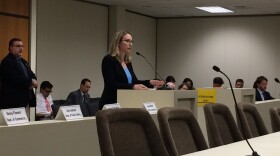The Atlantic hurricane season begins in less than a month. Researchers predict an active season with as many as 22 named storms, a small portion of which may become major hurricanes. But it takes only one storm to cause major damage, and emergency managers are preparing for the worst.
This year, the pandemic provides additional challenges. Managers must get informational messages into people’s homes without the usual aid of face-to-face communication. Should a hurricane hit, the standard method of gathering large numbers of evacuees in inland shelters is no longer a viable option. Communities are also experiencing emotional fatigue from the repeated disasters as they try to rebuild from previous storms, navigate the pandemic, and prepare for the upcoming hurricane season.
Host Frank Stasio talks with Stephanie Chavis, director of Robeson County Emergency Management, and Laura Hogshead, chief operating officer at the N.C. Office of Recovery and Resiliency. Stasio also talks with Robert Young, director for the Program of the Study of Developed Shorelines at Western Carolina University, about science behind the predictions for the upcoming hurricane season.
Interview Highlights
Robert Young, director for the Program of the Study of Developed Shorelines at Western Carolina University on how researchers predict hurricane season activity...
“Most experts see both a lot of heat in the ocean and the potential for a strong La Nina signal during this hurricane season, which means that we would tend to have an above-average number of tropical systems and an above-average number of them developing into hurricanes.”
...and why we shouldn’t pay too much attention to predictions.
“All of the guesswork about how many tropical systems we're going to have this year and how many of them will develop into large hurricanes is interesting to some degree from an academic point of view. But if I'm an emergency manager, you know, I want to be preparing for that worst case scenario every single year — no matter what the forecasts are.”
Stephanie Chavis, director of Robeson County Emergency Management, on how the pandemic has changed the way the county prepares for hurricane season.
“If you are dealing with COVID patients or people that have tested positive for COVID, they’re supposed to be in isolation, but their home’s flooded. We’re having to have someplace to put them. We're looking at hotels. We’re looking at closed schools.”
Laura Hogshead, chief operating officer for the North Carolina Office of Recovery and Resiliency, on how many people are dealing with previous storm damage during the pandemic.
“A tremendous number of communities are still living with damage from Matthew Florence and Dorian. We know that 77 communities were declared for federal disasters even before Dorian. So that's 77 of our 100 counties. ... almost everyone has been touched in some way by a disaster.”





